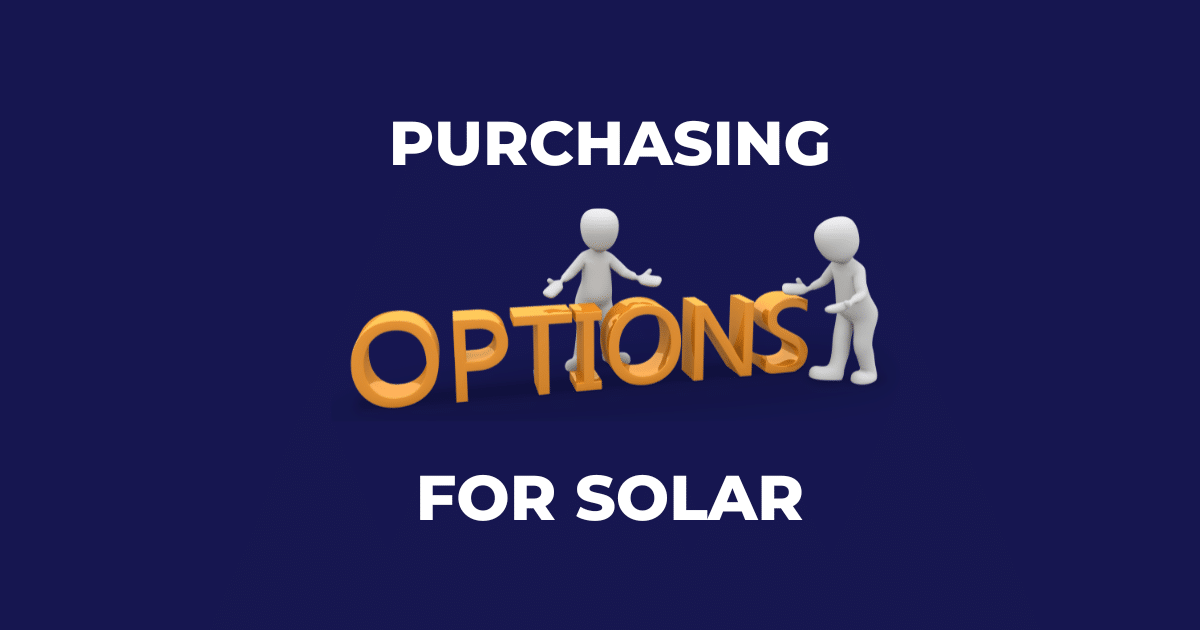Financing vs. Paying Cash for Solar Systems: Making an Informed Decision
Investing in solar energy is an excellent way to reduce electricity costs, lower carbon emissions, and increase energy independence. However, before embarking on this green journey, homeowners often face a crucial decision: should they pay cash upfront or explore financing options? In this blog post, we will delve into the considerations and benefits of Financing vs. Paying Cash for solar systems, equipping you with the knowledge to make an informed decision that aligns with your financial goals.
Considerations for Financing vs. Paying Cash
When deciding between financing vs. paying cash for a solar system, several essential factors come into play. Let’s explore these considerations:
- Upfront Cost vs. No Money Down
- Determine whether you prefer to make an upfront payment or opt for no money down and finance the system over a longer period.
- Interest Payments vs. No Interest Payments
- Evaluate your comfort level with making interest payments to stretch out the cost of the system or paying cash upfront without any interest.
- Payment Terms
- Consider whether you prefer shorter payment terms with higher monthly payments or longer terms with lower monthly payments when financing your solar system.
- Payback Period
- Assess your desired payback period. Paying cash typically results in a shorter payback period, as no interest is incurred, while financing extends the payback period.
- Personal Finances
- Evaluate your personal financial situation to determine whether you qualify for financing or if paying cash is a more viable option.
- Consider debt-to-income ratio requirements set by banks for financing.
- Highlight that financing a solar system does not add an additional bill but replaces the energy bill with a lower solar payment.
Benefits of Paying Cash
Paying cash for a solar system offers distinct advantages that may resonate with homeowners seeking immediate returns on their investment. Let’s explore the benefits:
- High Initial Payment and Return on Investment
- When paying cash, you make a higher initial payment, and as a result, you can start receiving returns on your investment once the system is paid off.
- Elimination of Bills
- Paying cash for a solar system eliminates both the solar bill and the electricity bill. Homeowners generate their own power each month, leading to significant savings.
- Zero Interest Payments
- Opting to pay cash means you do not have to pay any interest on the system, enabling greater long-term savings.
- Less Than Five-Year Payback Period
- Paying cash typically results in a shorter payback period, often less than five years, considering the rising energy rates.
Benefits of Financing
Financing a solar system opens up various benefits, providing homeowners with alternative avenues to embrace solar energy. Here are the advantages:
- Zero Money Down
- Financing options allow homeowners to get started without any upfront costs or down payments, making solar energy accessible to a broader audience.
- Deferred Payments
- With financing, homeowners can fund the entire solar system and delay the first payment until 30 days after the inspection has been passed, providing flexibility and convenience.
- Approximately 50% Energy Savings
- Financing the system still leads to significant savings, with homeowners experiencing approximately 50% savings on their energy bills compared to their current electricity costs.
- Lower Monthly Solar Bill
- While interest payments are involved in financing, the combined solar payment and interest amount is still significantly less than the current electricity costs, resulting in monthly savings.
- Flexible Loan Terms
- Financing offers flexibility in loan terms, ranging from 12 to 25 years. Homeowners can choose higher monthly payments for a quicker payoff or lower payments spread over a longer period.
- Competitive Interest Rates
- Interest rates for financing solar systems can be as low as 1.19% and go up to 5.19%, depending on creditworthiness.
- Emphasize that even with higher interest rates, financing costs are still lower than current electricity expenses.
Tax Credits
In addition to the considerations and benefits mentioned above, homeowners should also explore available tax credits when investing in solar systems. These credits can further enhance the financial viability of your solar investment. We recommend consulting with a tax professional to fully understand and leverage the available tax incentives.
Conclusion
Investing in solar energy is a significant decision, and choosing between financing and paying cash for a solar system requires careful consideration. By weighing the upfront costs, interest payments, payment terms, payback periods, and personal finances, homeowners can make informed decisions that align with their financial goals. Whether you choose to pay cash and enjoy shorter payback periods or opt for financing with flexible payment terms, investing in solar energy promises significant savings, reduced environmental impact, and a step towards a more sustainable future. You, in the topic of Financing vs. Paying Cash, which one would you choose?





